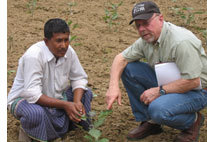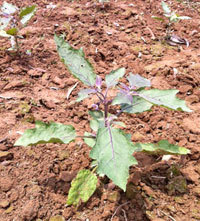Shelton lab members Xiaowei and Yanyan pose next to a beautiful bed of colorful tulips in Rochester NY during the 2014 Lilac festival.
Reposted from btbrinjal.tumblr.com (9 April 2014)
by Tony Shelton, Cornell University professor of entomology and a world expert on Bt plants
9 April 2014 – While visiting Bangladesh to conduct environmental safety assessments for Bt brinjal and help farmers develop resistant management programs to ensure the long-term durability of Bt eggplant, I visited Haidul Islam’s Bt brinjal fields on April 9. Mr. Islam was the same farmer whose crop the Financial Express on April 7 alleged was ridden with insects that Mr. Islam was spraying with insecticides.
 I found the exact opposite to be true. Mr. Islam and his associate proudly showed me his field of Bt brinjal. It was free of pest damage, and they were very pleased with the crop. Normally, they would have already sprayed insecticides on the plants to control the brinjal fruit and shoot borer, but did not have to since the plants resisted their attack. They were pleased to see no borer injury — as were the rest of us who were there inspecting the crop.
I found the exact opposite to be true. Mr. Islam and his associate proudly showed me his field of Bt brinjal. It was free of pest damage, and they were very pleased with the crop. Normally, they would have already sprayed insecticides on the plants to control the brinjal fruit and shoot borer, but did not have to since the plants resisted their attack. They were pleased to see no borer injury — as were the rest of us who were there inspecting the crop.
Bt brinjal resists the brinjal fruit and shoot borer — by far the most destructive pest of brinjal. Females lay their eggs on young vegetative shoots, and the emerging larvae bore into the plant and kill the shoots. Larvae from eggs laid on the fruit also bore into the fruit, making it unmarketable. Neither conventional nor organic sprays provide good control because the young caterpillars burrow into the plant as soon as they hatch. To build up sufficient residues for the larvae to be exposed to the insecticide, all the eggplant tissue must be soaked with insecticide.
Because of the usual intense use of insecticide sprays to control fruit and shoot borers, some consumers refer to harvested eggplants from South Asia as “pesticide bombs.” Bt brinjal is a far safer and healthier way for farmers to control the pest and market their fruit.
 Bt brinjal also allows farmers to use “integrated pest management,” or IPM, to control minor brinjal pests like aphids, thrips, leafhoppers, and whiteflies. Some of these pests can be controlled by other insects — biological control agents like ladybird beetles and lacewings. These beneficial insects are harmed by conventional and organic insecticide sprays. In using resistant plants instead of pesticides to control the borers, farmers allow beneficial insect populations to flourish.
Bt brinjal also allows farmers to use “integrated pest management,” or IPM, to control minor brinjal pests like aphids, thrips, leafhoppers, and whiteflies. Some of these pests can be controlled by other insects — biological control agents like ladybird beetles and lacewings. These beneficial insects are harmed by conventional and organic insecticide sprays. In using resistant plants instead of pesticides to control the borers, farmers allow beneficial insect populations to flourish.
Coupling insect-resistant plants with integrated pest management is a long-term sustainable strategy that is better for the environment, better for farmers, and better for consumer health.
Dr Tony Shelton published an op-ed article in the Finger Lakes Times, arguing that Integrated Pest Management is the best way to promote healthy food systems while improving the environment.
Quoted from the Finger Lakes Times (click for article) on Sunday March 30, 2014:
“I read with interest Mr. Tony Del Plato’s Guest Appearance column, “Is it about time food goes all-organic?” (Finger Lakes Times, March 16). I applaud Mr. Del Plato’s interest in our food system, but suggest that he — and readers — consider two more questions before they answer his: Is organic agriculture always safer to the environment and human health? Can all consumers afford the generally 20 to 30 percent higher prices of organic foods? The answer to these questions is simply “no.” Numerous scientific studies, including one by Stanford University researchers, have shown that organic foods are neither safer nor more nutritious than conventionally grown food. Furthermore, in this economy, most people simply can’t afford high-priced organic foods.”
Click here for the full article.
Congratulations to Xiaowei Li, visiting PhD student in the Shelton Lab, for winning the PhD oral competition at the 2014 Eastern Branch meeting of the Entomological Society of America. Li competed against other PhD students from colleges and universities throughout the northeast United States at the conference, which was held in Williamsburg, VA.
[From cornellcals.tumblr.com]
Congratulations to Tony Shelton, professor of entomology, who is part of a team of leading experts who will be honored with an Integrated Pest Management (IPM) Team Award from the Entomological Foundation. This annual award is presented to a collaboration that meaningfully contributes to pest control efforts using IPM practices. Dr. Shelton¹s and his fellow collaborators, known collectively as the ³Risk Assessment of Bt Plants on Beneficial Non-target Arthropods (NTA) IPM Team,² focused on the environmental risk assessment of Bt crops, which are genetically engineered to protect themselves from insects. The team is credited with developing a science-based framework for assessing the potential risks of Bt proteins on beneficial insects, or NTAs, with the goal of increasing the environmental safety of Bt crops and similar crops in the future. This work, including the team¹s analysis of data from lab and field studies around the world, has shown that Bt crops in use now do not cause unexpected harm on beneficial predators or parasitoids. Their analysis also showed that reductions in insecticide applications made possible by Bt-transgenic varieties have clear benefits on insect abundance in general and natural enemies in particular.
The award will be presented at the meeting of the Entomological Society of America in Austin, Texas, in November.